How To Clean Dirty Pool Walls


For some pool owners, a stained pool is beyond embarrassing, worse than tattered carpet and stained couch cushions. It can ruin your entire backyard experience. Hard-to-remove pool spots and stains can take a bit more than just brushing. You need some powerful methods to treat and prevent pool stains.
The first step to getting rid of those eyesore spots is to diagnose the stain type. Swimming pool stains can be caused by:
1. Metals or Minerals in the pool water coming out of solution
2. Rust coming through the wall, floor, or around fittings
3. Organic material like leaves, dirt, oils, worms or algae
A clue to identifying the type of pool stain may be found in the color of the stain.

Pool Stain Identification:
First of all, you should determine if the stain is Organic or Metallic.
Many people think that their pool plaster is stained, when they really just have an algae problem. If the stain brushes off, even slightly, or responds at all to shocking or sprinkling granular chlorine over it, then what you most likely have is an algae bloom. Visit our Pool Info page for more information on how to treat pool algae.
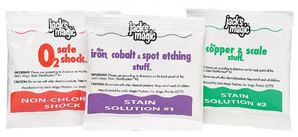
If it's not algae, it most likely is a mineral stain. But further identification is indicated. Introducing the Jack's Magic Stain ID kit. It has four topical tests to determine the type of pool stain you have. Whichever of the four removes your stain – this tells you what type of stain it is, and what product to remove it with. Works on all pool types. The pool has to be 70 degrees or warmer and there are some other specific pool stain testing instructions.
Mottling: Sometimes, you will not have a stain at all, but just normal mottling of the plaster. Remember that plaster is a natural product and is subject to variations in hue and shading. Streaks or mottled effects are considered natural, and they cannot be removed.
 Metal Stains: Metals create pool stains that appear reddish-brown, are very dark in color, or have a rust-like appearance to them. Copper stains in a pool will normally form a teal or turquoise blue/green color, while iron stains produce a rusty-red to brown, or green-brown splotches, and manganese will usually cause brownish-black or purple stains. Metals in pool water can be controlled with our Stain Away, Metal Free or Metal Klear.
Metal Stains: Metals create pool stains that appear reddish-brown, are very dark in color, or have a rust-like appearance to them. Copper stains in a pool will normally form a teal or turquoise blue/green color, while iron stains produce a rusty-red to brown, or green-brown splotches, and manganese will usually cause brownish-black or purple stains. Metals in pool water can be controlled with our Stain Away, Metal Free or Metal Klear.
Rust Stains: If it looks like rust, it probably is. Rust pool stains that appear in isolated spots are usually caused by metal objects that (mysteriously) find their way into the pool. Either that – or the rust is coming from the inside-out! On concrete pools, a rebar tie wire that is too close to the surface, or a crack that allowed water to reach the rebar steel. On vinyl pools, galvanized steel walls in wet soils can eventually break down , which can be slowed with paint and wall foam.
Mineral Stains: A mineral stain is actually a scale film mixed with dirt and oils deposited as a dull discoloration. A mineral stain is often found as a waterline stain, in scaly white deposits on the tile, but with certain water conditions, scale can deposit an all-over filmy, dirty stain onto other pool surfaces. Mineral stains in pool water can be controlled with our our Stain Away, Scale Free or Jack's Blue Stuff.
 Waterline Stains: Oils and dirt on the surface can combine with other particulate matter into a waterline stain, or "scum line" at the normal mid-tile water level. For pools that lower the water during winterization, you may notice several concentric watermarks in the top area of the pool wall. Using enzymes such as Pool Perfect or Pool Magic can remove and prevent oily organic organics from your pool water. For tile or vinyl at the waterline, use our Super Tile & Vinyl cleaner. Never use household cleaners which can bring phosphates and other problem chemicals into your pool water.
Waterline Stains: Oils and dirt on the surface can combine with other particulate matter into a waterline stain, or "scum line" at the normal mid-tile water level. For pools that lower the water during winterization, you may notice several concentric watermarks in the top area of the pool wall. Using enzymes such as Pool Perfect or Pool Magic can remove and prevent oily organic organics from your pool water. For tile or vinyl at the waterline, use our Super Tile & Vinyl cleaner. Never use household cleaners which can bring phosphates and other problem chemicals into your pool water.
Organic Stains: A greenish-brown colored pool stain is generally something organic, such as tannins leaching from leaves, acorns or mud sitting in the bottom of the pool. Algae, worms or other animals can also leave an ugly stain on your pool surface. Berries will create a red or blue stain in pools. Organic pool stains on concrete pools can be bleached out with chlorine granules sprinkled over the area. Vinyl pools should pre-dissolve first, and pour directly over the stain.
 All of these stains can be removed by lowering the water level and applying a weak solution of Acid Magic directly to the wall from a flower watering can. Add two cups of Acid Magic to one gallon of water. Pour directly on plaster or pebble surfaces and hose off thoroughly, per label instructions. Acid washing with muriatic acid can be caustic, but Acid Magic is low fume and won't irritate skin.
All of these stains can be removed by lowering the water level and applying a weak solution of Acid Magic directly to the wall from a flower watering can. Add two cups of Acid Magic to one gallon of water. Pour directly on plaster or pebble surfaces and hose off thoroughly, per label instructions. Acid washing with muriatic acid can be caustic, but Acid Magic is low fume and won't irritate skin.
Some of the worst pool staining can occur from mudslides or mulch and soil overflowing into the pool. For those that find it impossible to correct these conditions, recoating the pool with a dark colored plaster or dark pool liner can hide the pool stains!
Organic Pool Stains
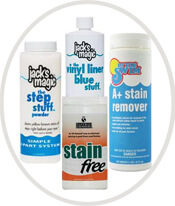
A super simple way to get rid of most organic pool stains is to shock the pool and give your pool a little TLC with a good brushing. This 'bleaching' removes most organic stains in concrete pools.
Sprinkle granular chlorine shock right over an organic stain to make it disappear instantly. For vinyl pools, always pre-dissolve pool shock first in a five gallon bucket full of water, pour over the area and brush well.
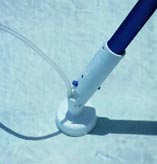 Use a Stain Master – The Jandy StainMaster is a device you connect to your pool pole. It has a small diameter, 25 ft hose with a gallon jug cap on the other end. Connect the cap to a gallon of muriatic acid, prime the hose, and you can deliver stain fighting muriatic acid directly to the source of stains. Very effective at plaster pool spot removal, but slow for large stained areas.
Use a Stain Master – The Jandy StainMaster is a device you connect to your pool pole. It has a small diameter, 25 ft hose with a gallon jug cap on the other end. Connect the cap to a gallon of muriatic acid, prime the hose, and you can deliver stain fighting muriatic acid directly to the source of stains. Very effective at plaster pool spot removal, but slow for large stained areas.
Localized stains can be removed with a gallon of Acid Magic and a piece of PVC Pipe. Pour a few cups of Acid Magic (or use dry acid, aka pH Reducer) into a length of 1.5″ PVC pipe that you hold over a small spot on a plaster surface. Attach a 90 degree fitting on the end to deliver the acid to a stain on the pool wall.
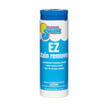 A simpler way is to sprinkle our EZ Stain Remover over the stained area, following label instructions. Our strongest pool stain remover, a combination of acids and stain fighters that can be used on any pool, concrete or vinyl.
A simpler way is to sprinkle our EZ Stain Remover over the stained area, following label instructions. Our strongest pool stain remover, a combination of acids and stain fighters that can be used on any pool, concrete or vinyl.
A related pool stain removal trick, for both concrete and vinyl pools, is to make your own Stain Sock filled with a granular acid – EZ Stain Remover, or our granular pH Reducer. Carefully pour 1 cup (8 oz) into a thin sock or hosiery. Tie it off tightly into a pool stain bag that you can place over stained areas with your pool brush. Let it sit for a few minutes, or you can lightly scrub the surface with the 'stain bag'. Finally a use for those orphan socks! 😉
 To skip the harsh chemicals, consider the Stain Eraser. This product is made of a rubbery polymer with a mild abrasive to give your scrubbing an extra kick. It also comes with a tile grout scrubber to get in between those fine cracks. There are two different types of Stain Erasers – tan for concrete pools and blue for vinyl pools. Attaches to your pool pole for hard to reach pool stains, or can be hand held.
To skip the harsh chemicals, consider the Stain Eraser. This product is made of a rubbery polymer with a mild abrasive to give your scrubbing an extra kick. It also comes with a tile grout scrubber to get in between those fine cracks. There are two different types of Stain Erasers – tan for concrete pools and blue for vinyl pools. Attaches to your pool pole for hard to reach pool stains, or can be hand held.
Inground pools can also use Pumice Stones and PoolStones, which are abrasive scrubbing stones that wear away as you clean surfaces. Safe for tile, grout, plaster, PebbleTec, and stonework of all types. Can use on vinyl pool steps, but pumice is too rough for vinyl liners.
 If your stain is all around the waterline of the pool because of material floating at the top, use an enzyme-based cleaner such as Natural Chemistry's Pool First Aid. Enzyme-based cleaners help to break down organic compounds and oils for natural stain removal. For winterized pools, Pool Magic Spring & Fall is a perfect stain fighter to prevent green pool openings, and stop winter waterline stains
If your stain is all around the waterline of the pool because of material floating at the top, use an enzyme-based cleaner such as Natural Chemistry's Pool First Aid. Enzyme-based cleaners help to break down organic compounds and oils for natural stain removal. For winterized pools, Pool Magic Spring & Fall is a perfect stain fighter to prevent green pool openings, and stop winter waterline stains
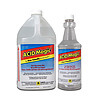 Organic pool stains over time can give your pool a dull light-brown appearance. It can be hard to notice because it happens so slowly. Eventually you may decide to drain and acid wash a plaster pool. Add a few cups of Acid Magic to a gallon of water in a flower watering can, and you can acid clean a plaster or pebble pool, tile or coping stones and winter waterline stains!
Organic pool stains over time can give your pool a dull light-brown appearance. It can be hard to notice because it happens so slowly. Eventually you may decide to drain and acid wash a plaster pool. Add a few cups of Acid Magic to a gallon of water in a flower watering can, and you can acid clean a plaster or pebble pool, tile or coping stones and winter waterline stains!
Metallic Pool Stains
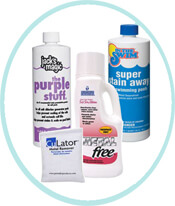
For metal pool stains, the first thing to do is to lock-up the metals in your pool water with a powerful Stain & Scale chemical like Metal Free, Metal Klear or our own Stain Away. For pools with high levels of metals in the water, such Stain & Scale chemicals are important to use regularly, to maintain protection and keep metal stains from returning.
A common follow up treatment to remove metal pool stains is Natural Chemistry's Stain Free, or our own A+ Stain Remover. Stain free and A+ Stain are ascorbic acid based pool stain removers. That's right, regular granular Vitamin C – and it makes a great all-natural pool stain remover. Linus Pauling would be so proud!
One way to test if Stain Free would work on your particular pool stain is to grind up (very finely) a small handful of Vitamin C tablets from your medicine cabinet, and sprinkle these over the stained area. If it works, buy a bottle. If it doesn't do anything, try our EZ Stain Remover instead.
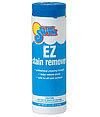 In The Swim's EZ Stain Remover is a powerful stain remover for metallic based pool stains. Iron, copper and manganese stains can all be removed without draining, in most cases. For very severe metal staining in pools, with very high metal levels, or problems for years, re-treatment may be needed, or results may be incomplete. However, for most pools with light overall staining or spots here or there, EZ Stain Remover can do the job.
In The Swim's EZ Stain Remover is a powerful stain remover for metallic based pool stains. Iron, copper and manganese stains can all be removed without draining, in most cases. For very severe metal staining in pools, with very high metal levels, or problems for years, re-treatment may be needed, or results may be incomplete. However, for most pools with light overall staining or spots here or there, EZ Stain Remover can do the job.
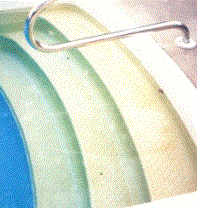 In-Pool Step Stains: If the staining has reached your pool steps and they need an extra scrub, try Jack's Magic Step Stuff to whiten your pool steps back to brand new condition. A two-step process that restores stained ABS plastic vinyl liner pools steps to like-new condition. Be sure to follow water balance guidelines for best results.
In-Pool Step Stains: If the staining has reached your pool steps and they need an extra scrub, try Jack's Magic Step Stuff to whiten your pool steps back to brand new condition. A two-step process that restores stained ABS plastic vinyl liner pools steps to like-new condition. Be sure to follow water balance guidelines for best results.
Preventing Pool Stains
To keep organic pool stains out of your pool, do your best to keep the pool clean. This may involve trimming trees or bushes around the pool, investing in a better winter pool cover or an automatic pool cleaner.
To prevent metallic stains from returning, make sure to keep your water balanced using a good water chemical test kit, and keep metals and minerals locked in solution with a good Stain & Scale chemical, as mentioned [many times] above. These chemicals deplete over a few weeks, so maintenance doses of sequestering agents are needed for continuous protection from staining and scaling.
![]()
In hard water areas, waterline scale is very common. A deposit often whitish in color, it can mix with dirt and oil to take on a brownish or gray color. In Arizona and other areas, there are companies that specialize in bead-blasting tiles for scale removal, which can produce excellent results.
Calcium scale or efflorescence can also be scraped off with a putty knife or flat head screwdriver before being polished up with a Acid Magic. Acid can be poured on from the bottle, or if you have a clean spray bottle, fill it half full of water and add acid to fill the bottle. Now you can spray on just enough acid to do the job with less effect on your pool's pH. Be sure to wear gloves and goggles, and rinse off the acid within a minute or two.
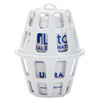 Metals in your water can come from well-water, from iron or copper pipes, or copper pool heat exchangers. Metals are not impossible to remove from pool water. If you have severe metallic pool stains in your pool, try CuLator Metal Eliminator. Drop the CuLator 4.0 Powerpak your pump basket and it actually absorbs metals such as Copper, Iron, Manganese, Cobalt, Silver, and Nickel.
Metals in your water can come from well-water, from iron or copper pipes, or copper pool heat exchangers. Metals are not impossible to remove from pool water. If you have severe metallic pool stains in your pool, try CuLator Metal Eliminator. Drop the CuLator 4.0 Powerpak your pump basket and it actually absorbs metals such as Copper, Iron, Manganese, Cobalt, Silver, and Nickel.
I hope that these suggestions will help you understand pool stains a bit more and provide some useful methods for effective pool stain removal.
Stop pool stains before they start by keeping your pool clean, your chemical levels balanced, and your minerals sequestered.
Where pool stains are concerned, an ounce of prevention is worth a pound of cure, and in this case, a hassle free beautiful pool! See our other pool stain blog posts:
Stain Removal in a Plaster Pool
Stain Removal in a Vinyl Pool
Stain Removal in a Fiberglass Pool
FEATURED PRODUCTS:

Sabrina Potirala
InTheSwim Staff Blogger




 (2 votes, average: 4.50 out of 5)
(2 votes, average: 4.50 out of 5)
![]() Loading...
Loading...
How To Clean Dirty Pool Walls
Source: https://blog.intheswim.com/swimming-pool-stains-removal-guide/
Posted by: scottofirther73.blogspot.com

0 Response to "How To Clean Dirty Pool Walls"
Post a Comment